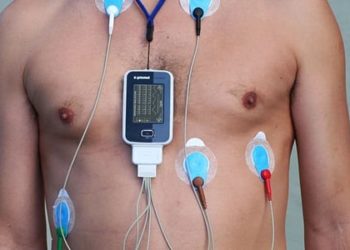Alteplase unlikely to reduce disability after mild stroke without disabling deficits
1. In this randomized controlled trial, administration of alteplase within 3 hours of mild stoke did not lead to a reduction in disability at 90 days post-stroke compared to aspirin.
2. Patients treated with alteplase had a slightly higher rate of spontaneous intracranial hemorrhage but no differencesin mortality compared to those treated with aspirin.
Evidence Rating Level: 2 (Good)
Study Rundown: For patients with major ischemic strokes that present with disabling deficits, tPA therapies, such as alteplase, have been shown to reduce long-term disability. However, many physicians are hesitant to administer tPA for minor strokes without clear disabling deficits, even though as many as 30% of these strokes lead to functional disabilities at 90 days. To determine if timely tPA therapy reduces disability for these minor strokes, patients suffering minor stroke without disabling deficits were randomized to receive alteplase or aspirin within 3 hours of stroke onset and assessed 90 days later for disabilities. Though the trial was terminated early due to financial reasons, there was no difference in the rate of favorable outcomes, global favorable recovery, or disability scale scores between the two groups at 90 days. In addition, there was a slight but statistically significant increase in the rate of spontaneous intracranial hemorrhage (sICH) in patients treated with alteplase.
Despite the early termination of this trial, it seems likely that tPA is of little benefit for patients with minor ischemic strokes without clear disabling deficits at stroke onset. Still, even with objective disability scoring, clinician judgement was necessary for enrollment of patients, and it is unclear if patients with minor disabling deficits from stroke would benefit from alteplase. It may be prudent to conduct a larger and better funded trial of patients with no disabling deficits and mild disabling deficits from stroke to more definitively determine if tPA is beneficial for patients with minor strokes.
Click here to read the study, published in JAMA
Relevant Reading: Outcomes in Mild Acute Ischemic Stroke Treated With Intravenous Thrombolysis: A Retrospective Analysis of the Get With the Guidelines–Stroke Registry
In-Depth [randomized controlled trial]: In the Potential of rtPA for Ischemic Strokes With Mild Symptoms (PRISMS) trial, 313 patients with mild strokes but no disabling deficits were recruited to receive either alteplase plus an aspirin placebo or an alteplase placebo and 325mg of aspirin and reassessed at 90 days (89.9% completed trial’s primary outcome). Inclusion criteria were age >18yo, NIH Stroke Scale (NIHSS) score of 0 to 5, and deficits judged to be clearly not disabling while exclusion criteria included prestrike disability, dysphagia, ICH on imaging, and standard contraindication to alteplase. The primary outcome was a modified Rankin Scale (mRS) of 0 or 1 reflecting favorable functional outcome while secondary analyses were full mRS scores and a global favorable recovery score. Enrollment was terminated early due to patient recruitment below target and withdrawal of support from the sponsor, Genetech Inc, as the allotted funds for the trial were used.
Patients who received alteplase had similar rates of favorable functional outcomes compared to controls (absolute risk difference -1.1%; CI95 -9.4 to 7.3%). Overall mRS scores (OR 0.81; CI95 0.5 to 1.2) and global favorable recovery scores (OR 0.86; CI95 0.5 to 1.4) were also similar between groups. Alteplase was associated with a higher rate of sICH within 36 hours of administration (absolute risk difference 3.3%; CI95 0.8 to 7.4%).
Image: CC/Wiki
©2018 2 Minute Medicine, Inc. All rights reserved. No works may be reproduced without expressed written consent from 2 Minute Medicine, Inc. Inquire about licensing here. No article should be construed as medical advice and is not intended as such by the authors or by 2 Minute Medicine, Inc.






